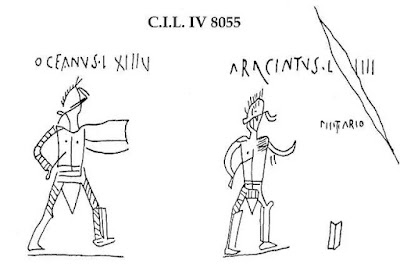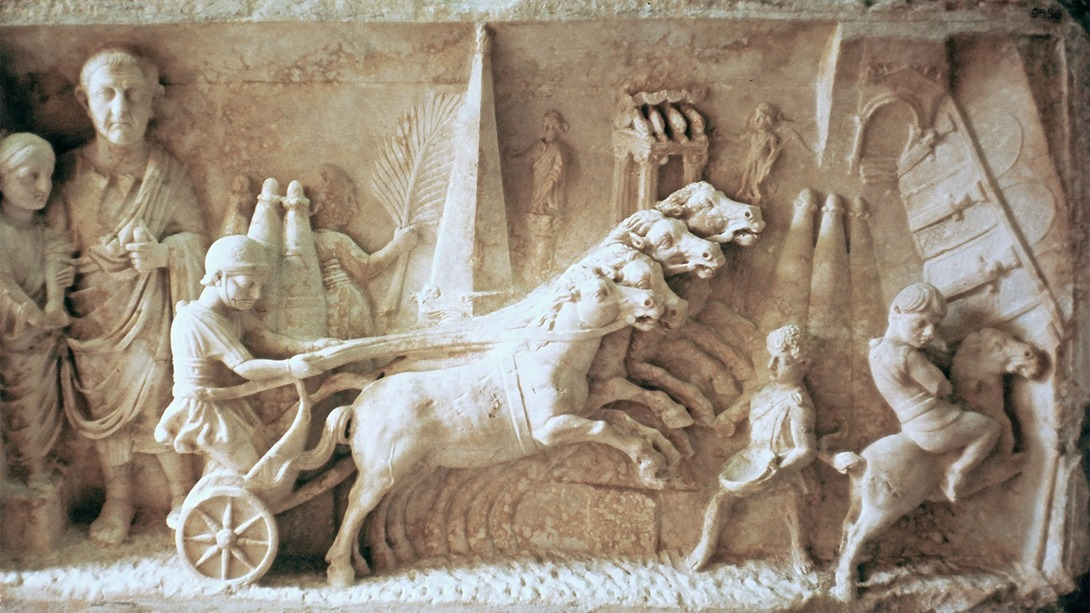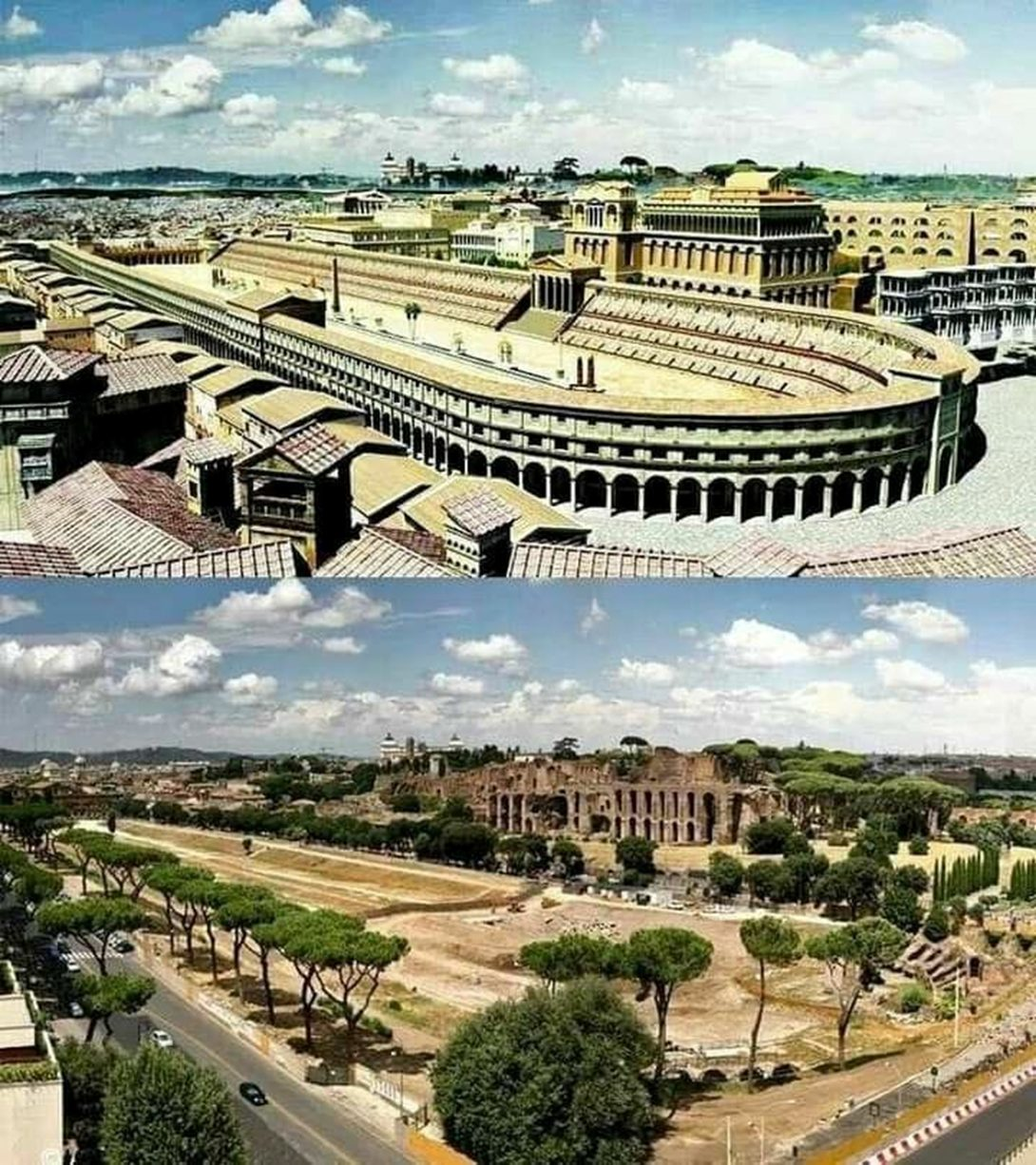DĒ POTESTĀTE RŌMĀNĀ [Chesnutt: the Road to Latin (1933)]
In principiō Rōma erat parva urbs. Bellō
potestātem augēbat. Prīmō proeliō cum gentibus proximīs gerēbantur.
Virtūs gentium proximārum erat magna sed Rōmānī erant victōrēs.
Tandem Rōma erat domina Italiae. Trāns mare habitābant Carthāginiēnsēs. Erant hostēs
Rōmānōrum. Magnam classem habēbant; itaque mare regēbant. Magnum numerum
nāvium longārum habēbant et bellum amābant. Erant longa bella inter
Rōmānōs et Carthāginiēnsēs; magna erat caedēs. Tandem Rōmānī erant victōrēs;
itaque Rōma erat domina maris. Tum in Asiā et in Galliā et in Britanniā bella
gerēbantur. Tandem Asia, Gallia, Britannia in Rōmae potestāte erant. Sīc
terrā marīque potestās Rōmāna erat maxima.
Vocabulary
(a) 3rd declension nouns
caedēs, caedis [3/f]: slaughter, massacre
classis, -is [3/f]: fleet
gēns, gentis [3/f]: race, tribe
hostis, hostis [3/m]: enemy; often pl: hostēs (the enemy)
nāvis, -is [3/f]: ship
nāvis longa: warship
potestās, potestātis [3/f]: power, abili
(b) other words
augeō, augēre [2]: increase
Carthāginiēnsis: Carthaginian; the spelling is sometimes
with a /k/: Karthāginiēnsis
i-stem nouns
[1] From this post and the previous one (02.04.24: Review of
3rd declension nouns [5]):
The five nouns listed below are all 3rd declension, but they
are a subset classified as i-stem nouns:
urbs, urbis [3/f]: city
cīvis, -is [3 m/f]: citizen
gēns, gentis [3/f]: race; tribe
nāvis, -is [3/f]: ship
mare, -is [3/n]: sea
Now look at those nouns in context and their endings in
bold:
[i] -ium
Rōma est maxima urbium │ Rome is the
greatest of the cities
iūra cīvium Rōmānōrum │ the rights of
Roman citizens
virtūs gentium proximārum erat magna │ the
courage of the neighbouring races
magnum numerum nāvium longārum habēbant │ they
had a great number of long ships
[ii] -ī
ā marī paucae nāvēs Rōmam veniunt │
few ships come from the sea to Rome
terrā marīque │ by land and by sea
[iii] -ia
nam maria Italiam ferē circumstant │ for the
seas almost surround Italy
Note:
[i] genitive plural in -ium (e.g. gentium)
[ii] neuter nominative (and accusative) plural in -ia
(maria)
[iii] neuter ablative singular in -ī (marī);
some masculine and feminine nouns may have alternative ablative singular forms
e.g. cīve / cīvī; nāve / nāvī
Those endings [-ium; -ia; -ī] differ from other 3rd
declension nouns. Compare:
[i] genitive plural
[a] clāmōrēs spectātōrum (the shouts of
the spectators) [b] Rōma est maxima urbium
[ii] neuter nominative (and accusative) plural:
[a] iūra … dīligenter servābantur (rights were
carefully protected) [b] nam maria Italiam ferē circumstant
[iii] ablative singular
[a] Urbs Rōma ab ōre flūminis
Tiberis nōn longē abest (The city of Rome is not far away from the
mouth of the River Tiber) [b] ā marī paucae
nāvēs Rōmam veniunt
[2] There is a fourth ending which applies to i-stem nouns:
the accusative plural of masculine and feminine nouns can
be either -ēs (like other 3rd declension
nouns) or -īs (only i-stem nouns) i.e. -īs is
an alternative ending, not a complete replacement.
[3] Some dictionaries and vocabulary lists indicate i-stems
either by simply stating it e.g. Wiktionary: nāvis f (genitive nāvis);
third declension, i-stem, or by giving the genitive plural ending
e.g. nāvis, -is, nāvium [3/f]. However, not all will do that and,
in fact, Wiktionary is not consistent in the information it provides.
Below are the i-stem nouns used in this text and in the
previous one:
caedēs, -is, caedium [3/f]: massacre; slaughter
cīvis, -is, cīvium [3 m/f]: citizen
classis, -is, classium [3/f]: fleet
gēns, gentis, gentium [3/f]: race; tribe
hostis, -is, hostium [3/m]: enemy
mare, -is, marium [3/n]: sea
nāvis, -is, navium [3/f]: ship
urbs, urbis, urbium [3/f]: city
[4] How can you know they are i-stem nouns if nobody tells
you?
When learning any language there are features that are more
important than others. There is a risk, which I have experienced too, of
becoming dragged down by lengthy explanations of comparatively minor points
which simply interrupts the flow of learning. Moreover, explanations –
especially if you’re still finding your way around Latin – can seem daunting,
full of complex terms that can be difficult to remember and with many
exceptions and, at times, inconsistencies in information given, for example, in
online sources.
Depending on your level of Latin, and depending on how
deeply you want to explore, you can choose:
Choice #1: Read through the information above, note the
differences in endings and the alternative ending [-ium, -ī, -ia, -ēs / -īs],
all of which is summarised in images #1 and #2, and move on. The
differences are slight and generally do not affect comprehension.
Choice #2: We will look at the characteristics which
indicate i-stem nouns; the topic will be discussed again at Level 3. However,
bear in mind the following comments from Allen and Greenough’s Latin grammar:
“There is much variety in the practice of the ancients”; “The i-declension was
confused even to the Romans themselves” i.e. A & G indicate that, whatever
‘patterns’ or ‘rules’ are listed, usage over the centuries is not consistent.
To identify i-stem nouns, we can put the nouns into three
categories but, as mentioned above, there are exceptions.
(1) Image #1: Nouns in the 3rd declension can be classified
as [1] increasing and [2] non-increasing; those
terms refer to the number of syllables in the nominative and genitive singular
[1] increasing nouns: those with one or
more syllables in the genitive singular than the nominative singular
Nominative singular: ōs (1 syllable); ho-mō (2 syllables);
spec-tā-tor (3 syllables)
Genitive singular: ō-ris (2 syllables);
ho-mi-nis (3 syllables); spec-tā-tō-ris (4 syllables)
[2] non-increasing nouns (also known as
parisyllabic): the same number of syllables in the nominative and genitive
singular
Nominative singular: cae-dēs; cī-vis; hos-tis (2 syllables)
Genitive singular: cae-dis; cī-vis; hos-tis (2 syllables)
Image #1 compare:
[A] increasing noun with [B] non-increasing
noun
[A]
Nominative Singular: ho-mō (2 syllables)
Genitive Singular: ho-mi-nis (3 syllables)
Ablative Singular: ho-mi-ne
Accusative Plural: ho-mi-nēs
Genitive Plural: ho-mi-num
[i] In [B] the changes apply to the non-increasing nouns:
Nominative Singular: nā-vis (2 syllables)
Genitive Singular: nā-vis (2 syllables)
Ablative Singular: (1) nāve, or (2) nāvī, but
the alternative ending in -ī is inconsistent; some nouns show this
ending and some do not; the -ī ending is found more in poetry
Accusative Plural: (1) na-vēs, or (2) navīs i.e.
alternative endings*
Genitive Plural: nā-vium
Similarly:
cīvis (citizen) > abl sg: cīve / cīvī;
acc pl: cīvēs / cīvīs; gen pl: cīvium
classis (fleet) > abl sg: classe / classī;
acc pl: classēs / classīs; gen pl: classium
*[ii] Again, note this comment from Allen and Greenough:
“The ablative singular … of many masculines and feminines,
ends in -ī” i.e. not all of them, for
example:
hostis (enemy) > *abl sg. hoste (i.e. no
alternative ending in -ī)*; acc pl: hostēs / hostīs; gen pl:
hostium
caedes (slaughter) > *abl sg. caede (i.e. no
alternative ending in -ī)*; acc pl: caedēs / caedīs; gen pl:
caedium
Image #1 shows that these changes / alternative endings
(marked in red) are very few and do not affect comprehension
[iii] Image #2: Look out for a handful of nouns that have an
alterantive accusative in -im (rather than -em), a common
example being turris, is [3/f]: tower
(2) Image #3: monosyllabic (one syllable) nouns which end in a consonant + /s/:
Nominative Singular: urbs
Accusative Plural: (1) urbēs, or (2) urbīs
Genitive Plural: urbium
dēns (tooth) > acc pl: dentēs /
dentīs; gen pl: dentium
This category is quite distinctive. Here are some common
nouns which decline in the same way as urbs:
dēns (tooth) > acc pl: dentēs /
dentīs; gen pl: dentium
gēns (tribe) > acc pl: gentēs /
gentīs; gen pl: gentium
mōns (mountain) > acc pl: montēs /
montīs; gen pl: montium
nox [x = /ks/ = ‘2 consonants’] > acc pl:
noctēs / noctīs; gen pl: noctium
pars (part) > acc pl: partēs /
partīs; gen pl: partium.
(3) image #4: neuter nouns ending in -e, -al,
-ar nouns have [i] -ī in the ablative singular [ii] -ia in
the nominative and accusative plural, and [iii] -ium in the
genitive plural
Many of these nouns do not frequently occur, but some common
ones are:
cochlear, cochleāris [3/n]: spoon
exemplar, exemplāris [3/n]: pattern; copy; example
vectīgal, -is [3/n]: tax; tribute
____________________
In the beginning Rome was a small town. It increased its power by war. The first battle was fought the neighboring nations. The courage of the neighbouring nations was great, but the Romans were the victors. At last Rome was the mistress of Italy. The Carthaginians lived across the sea. They were the enemies of the Romans. They had a great fleet; therefore they ruled the sea. They had a large number of long ships and loved war. There were long wars between the Romans and the Carthaginians; the slaughter was great. At last the Romans were the victors, and so Rome was the mistress of the sea. Wars were then waged in Asia, in Gaul, and in Britain. At last Asia, Gaul, and Britain were under the power of Rome. Thus Roman power on land and sea was the greatest.




































